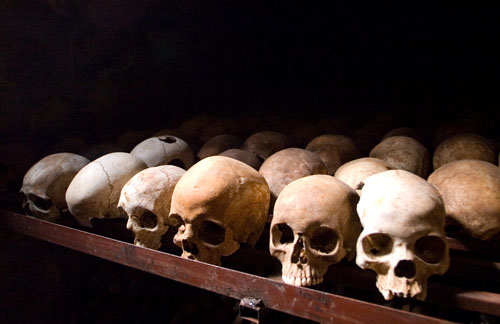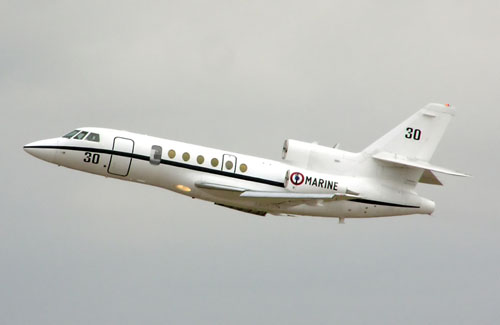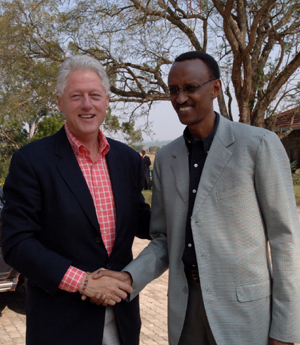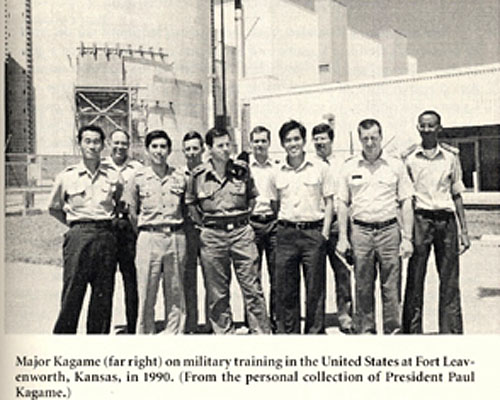
The Nyamata Memorial in Rwanda, pays tribute to the memory of the hundreds of thousands of Rwandans killed during the 1994 genocide.
April 8, 2010
On April 7 the United Nations began its
annual commemoration of the anniversary of what we know as the 1994 Rwanda Genocide, when as many as one million Rwandans were slaughtered in 100 days.
The ceremonies raise several questions for all those who contest the received history of the Rwanda Genocide: How to honor Rwanda’s dead without honoring the lies?
And, how to honor six million more Congolese dead, but not commemorated, in the ongoing aftermath of the Rwanda Genocide when Rwanda’s war crossed its western border into neighboring D.R. Congo?
Though both tell the received history of the Rwanda Genocide; the
BBC and
Wikipedia mark its outset not on April 7th, as the UK, UN, and Rwandan officialdom do, but on April 6th, when, in 1994, the assassination of Rwandan President
Juvénal Habyarimana and Burundi President
Cyprien Ntaryamiratriggered the ensuing panic and violence that grew into the horror of the next 100 days and beyond. The two presidents were flying home from a conference between east and central African leaders in Tanzania, held to discuss ways to end violence between ethnic Hutus and Tutsis from Burundi and Rwanda, when their plane was shot out of the sky over Rwanda’s capital, Kigali.
On the evening of April 6, 1994, the BBC
reported:
The deaths of the presidents, both Hutus, look likely to make the situation in both states [Rwanda and Burundi] worse. Heavy fighting has already been reported around the presidential palace in Rwanda after news of the deaths spread. News agencies in Kigali said explosions have been rocking the city but it was not immediately clear who was involved in the fighting.

Shortly before 8:20 pm local time (6:20 pm UTC), on April 6, 1994, the Rwandan presidential jet, a Dassault Falcon, circled once around Kigali International Airport before coming in for final approach in clear skies. A surface-to-air missile struck one of the wings, before a second missile hit its tail. The plane erupted into flames in mid-air before crashing into the garden of the presidential palace, exploding on impact, killing both the Rwandan and Burundian presidents. Photo courtesy Wikimeda Commons.
Carla del Ponte, lead prosecutor for the International Criminal Tribunals on Rwanda and Yugoslavia,
in her book “Madame Prosecutor; Confrontations with Humanity’s Worst Criminals and the Culture of Impunity,” tells the story of how she was fired by the UN after announcing her intent to prosecute sitting Rwandan President Paul Kagame for the assassination of Presidents Habyarimana and Ntaryamira that triggered the genocide.

Former President Bill Clinton is such a good friend and admirer of Rwandan President Paul Kagame that he presented Kagame with one of his Global Citizenship Awards in a ceremony on September 24, 2009.
The received history says that former President Bill Clinton and the rest of the world stood by and let extremist Hutus murder up to a million Rwandan Tutsis and moderate Hutus until current Rwandan President Paul Kagame and his
Rwandan Patriotic Front (RPF) army arrived in Kigali to end the killing, restore order and begin a reconciliation process. Volumes of interviews, testimonies, mass-grave exhumations and identifications as well as statistical analysis by five different teams of investigators, tell a far more complex story that includes a psychosis-induced mass-murder. Five teams of investigators came to varying sets of conclusions which University of Michigan Professor Allan Stam
explained in
Coming to a New Understanding of the 1994 Rwanda Genocide. Four out of five teams concluded that the vast majority of those who died were Hutus.
French is Dead, Long Live English!
Some say that Clinton could have stopped it with a phone call because the US and UK were backing Kagame’s RPF Tutsi Army, whose advance from the north after the assassinations stirred waves of panic and consequent violence in southern Rwanda.
But, whether he could have stopped it that easily or not, and/or at what point, the Rwanda Genocide ultimately represented the triumph of the US, the UK, and their allies over France in a fierce scramble for Central Africa’s vast natural resources, including the dense mineral wealth in eastern D.R. Congo.
President
Paul Kagame, an English speaking Rwandan refugee in Uganda from the age of two, rose to become an officer in Uganda’s Army, then Intelligence Chief, then RPF Commander, after training at Fort Leavenworth, Kansas, where future generals learn to plan invasions.

Paul Kagame, far right, with his comrades at the US Army’s Fort Leavenworth, Kansas, 1990.
The RPF army invaded Rwanda across its northern border with Uganda in 1990 and arrived victorious in Kigali at the end of the 100 days following the Habyarimana and Ntaryamira assassinations.
Though reported to have stood by during the genocide, the US moved in to build a large military base in Rwanda almost as soon as the RPF triumphed, as reported in the New York Times, July 27, 1994:
The United States is preparing to send troops to help establish a large base in Rwanda to bolster the relief effort in the devastated African nation, Administration officials said today.
(Administration officials’ claim that relief was the base’s purpose is disputed by those who dispute the history of the genocide.)

General, and now Rwandan President, Paul Kagame.
All Rwandans share the native African language, Kinyarwanda, “Rwanda” for short, but before the English-speaking RPF victory, urban, educated Rwandans also spoke French, the language of the dominant European power and thus the language in which Rwanda conducted international business.
The new RPF rulers declared English the language of business, causing enormous stress and dislocation to French-speaking Rwandan professionals, and in November 2009, the Commonwealth Heads of Government
welcomed Rwanda, a former member of the Commonwealth’s equivalent,
La Francophonie, as a member.
Shortly thereafter, “French is dead; long live English in Rwanda!,”
a news report from the English stream of French-based satellite channel, celebrated the end of 100 years dominance of the French language and French business ties.
Law Professor Peter Erlinder, former National Lawyer’s Guild President, lead defense counsel for the International Criminal Tribunal on Rwanda, and author of the
Rwanda Documents Project, offered these comments on the commemoration of the 1994 Rwanda Genocide:
“Commemorating the ‘Rwandan Genocide’ is certainly a noble goal, but without acknowledging the role of the current Rwandan President Kagame in the assassination of Presidents of Rwanda and Burundi, and the crimes committed by his forces in their 90-day assault to seize power in 1994, whether those crimes are called ‘Genocide’ or ‘Crimes Against Humanity,’ converts a solemn remembrance into a farce of political deception and ‘cover-up, organized by the dominant member of the UN Security Council and Kagame’s most-important backer, the government of the United States.
“Investigating judges in France and Spain have indicted Kagame and his RPF forces. US government and UN documents from 1994 confirm that Kagame’s RPF is guilty of mass-killings during all of 1994, which continue in the eastern Congo to this day. More than 6-million have died as a result of the Kagame-initiated war and violence in Central Africa and the former Chief UN Prosecutor, Carla del Ponte, has concluded that Kagame’s RPF is responsible for crimes that have been charged to the side that lost the Rwandan Civil War between 1990 and 1994.
“In 2009, the four top-military leaders of the vanquished army have been acquitted of planning or conspiring to commit genocide, or any other crimes, in the UN Tribunal.
“Del Ponte has publicly said that she was fired from her UN job by the US in 2003, when she insisted on prosecuting Kagame and the RPF.
“There is much, much more to a ‘genocide remembrance’ than meets the eye even when the UN is involved and history is ignored, or ‘covered-up’ in the interests of superpower geopolitical interests.”
Never again?
This admonition from the web pages of the UN’s 2010
Rwanda Genocide commemoration could not more perfectly describe Rwanda as it is now, under Rwandan President Paul Kagame and his ruling RPF Party:
Warning Signs of Genocide
The Special Adviser on the Prevention of Genocide, working with other genocide experts, has compiled a list of warning signs that could indicate that a community is at risk for genocide or similar atrocities. It includes:
• the country has a totalitarian or authoritarian government where only one group controls power
• the country is at war or there is a lawless environment in which massacres can take place without being quickly noticed or easily documented
The UN is at least good for comic relief, but pretending that these were warning signs of Rwanda’s past, and not its present, does not honor the dead. It honors the lies told by the US, the UK, and the UN to cover their responsibility for the loss of millions of African lives.
Senator Russ Feingold calls for political space in Rwanda
On March 2nd, as grenades exploded in Kigali, and Kagame’s political targets fled the country, Senator Russ Feingold, Chair of the Senate Subcommittee on Africa, read the
Feingold Statement on the Fragility of Democracy in Africa, into the Congressional Record, calling on President Barack Obama to make human and political rights a condition for the support of the US and other “donor nations” in Africa.
Feingold stressed the urgency of the Rwandan political situation, with presidential election polls approaching in August.
The Africa Faith and Justice Network, Human Rights Watch, Amnesty International, Friends of the Congo, the Commonwealth Human Rights Initiative Group, Reporters without Borders, the Committee to Protect Journalists and the Greens/European Free Alliance, have also called for a free and fair election in Rwanda and an end to civil and human rights abuses.
This is advocacy within a very narrow, very contradictory political space, that of Western parliamentary democracy within the larger context of an unsustainable Western scramble for Africa’s energy and mineral resources, driven by the West’s unsustainable, growth-driven culture and economy.
Ann Garrison is an independent journalist and contributor to the San Francisco Bay View, Global Research, Digital Journal, KPFA and KMEC Radio News, and her own blog, Plutocracy Now: the War and Plunder Report. More of her radio/video reports available on YouTube.
More Info
KPFA News report 4/4/10: Peter Erlinder and Paul Rusesabagina discuss the 16th anniversary of political assassinations that triggered the Rwanda Genocide


















No comments:
Post a Comment
Note: only a member of this blog may post a comment.